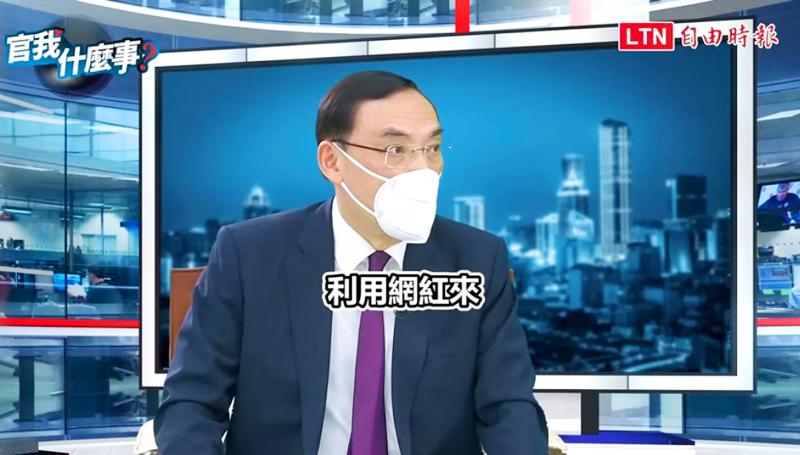The Ministry of Justice has become aware of “external forces” paying Internet streamers to make false statements in an attempt to influence November’s nine-in-one elections, Minister of Justice Tsai Ching-hsiang (蔡清祥) said yesterday.
Tsai made the remarks in an interview with the Chinese-language Liberty Times (the Taipei Times’ sister newspaper), the contents of which were aired yesterday.
The ministry is continuing to monitor such behavior and would strive to combat cognitive warfare tactics, he said.

Photo: screen grab from Guan Wo Shenme Shi
Attempts to influence Taiwanese politics by giving Internet personalities and streamers money and having them spread false information is a new tactic, Tsai said.
“External forces have been known to use a variety of methods to influence Taiwanese politics,” such as subsidizing a particular group or candidate through Taiwanese businesspeople, or exerting influence over local temples to have them persuade local residents to vote for certain candidates, he said.
Other methods have involved Chinese spouses in Taiwan and underground banking institutions offering voters all-expenses-paid trips to China, he added.
Tsai said that he places great emphasis on national security and because of this, he has arranged for prosecutors to attend seminars by national security experts so that they can prosecute cases involving national security issues based on what is best for protecting Taiwan.
The ministry has also drafted an amendment to the National Security Act (國家安全法) that would send criminal cases involving people or organizations nominally controlled by a foreign power, China, Hong Kong or Macau straight to the second appellate court, Tsai said.
The amendment would also make corporate espionage a criminal act, as well as leaking the nation’s core technological secrets to foreign assets, he said.
The technology sector is an important asset for Taiwan and crucial to its national security, he added.
While local elections have always been the most prone to corruption, modern technology can spread false information swiftly, an issue the ministry must seek to control, Tsai said.
“We aren’t ruling out the possibility of external forces utilizing modern technology, such as e-wallets and blockchain technology, to facilitate such payments,” he said, adding that the ministry would also be monitoring the spread of false information and nip it in the bud.

A magnitude 5.6 earthquake struck off the coast of Yilan County at 12:37pm today, with clear shaking felt across much of northern Taiwan. There were no immediate reports of damage. The epicenter of the quake was 16.9km east-southeast of Yilan County Hall offshore at a depth of 66.8km, Central Weather Administration (CWA) data showed. The maximum intensity registered at a 4 in Yilan County’s Nanao Township (南澳) on Taiwan’s seven-tier scale. Other parts of Yilan, as well as certain areas of Hualien County, Taipei, New Taipei City, Taoyuan, Hsinchu County, Taichung and Miaoli County, recorded intensities of 3. Residents of Yilan County and Taipei received

Taiwan has secured another breakthrough in fruit exports, with jujubes, dragon fruit and lychees approved for shipment to the EU, the Ministry of Agriculture said yesterday. The Animal and Plant Health Inspection Agency on Thursday received formal notification of the approval from the EU, the ministry said, adding that the decision was expected to expand Taiwanese fruit producers’ access to high-end European markets. Taiwan exported 126 tonnes of lychees last year, valued at US$1.48 million, with Japan accounting for 102 tonnes. Other export destinations included New Zealand, Hong Kong, the US and Australia, ministry data showed. Jujube exports totaled 103 tonnes, valued at

TRUST: The KMT said it respected the US’ timing and considerations, and hoped it would continue to honor its commitments to helping Taiwan bolster its defenses and deterrence US President Donald Trump is delaying a multibillion-dollar arms sale to Taiwan to ensure his visit to Beijing is successful, a New York Times report said. The weapons sales package has stalled in the US Department of State, the report said, citing US officials it did not identify. The White House has told agencies not to push forward ahead of Trump’s meeting with Chinese President Xi Jinping (習近平), it said. The two last month held a phone call to discuss trade and geopolitical flashpoints ahead of the summit. Xi raised the Taiwan issue and urged the US to handle arms sales to

BIG SPENDERS: Foreign investors bought the most Taiwan equities since 2005, signaling confidence that an AI boom would continue to benefit chipmakers Taiwan Semiconductor Manufacturing Co’s (TSMC, 台積電) market capitalization swelled to US$2 trillion for the first time following a 4.25 percent rally in its American depositary receipts (ADR) overnight, putting the world’s biggest contract chipmaker sixth on the list of the world’s biggest companies by market capitalization, just behind Amazon.com Inc. The site CompaniesMarketcap.com ranked TSMC ahead of Saudi Aramco and Meta Platforms Inc. The Taiwanese company’s ADRs on Tuesday surged to US$385.75 on the New York Stock Exchange, as strong demand for artificial intelligence (AI) applications led to chip supply constraints and boost revenue growth to record-breaking levels. Each TSMC ADR represents